单项选择之陈述句和疑问句
陈述句、疑问句、祈使句和感叹句讲解及练习

陈述句、疑问句、祈使句和感慨句讲解与练习一、陈述句陈述句就是表达一件事情后者表达一种看法的句子。
陈述句的分类陈述句可以分为肯定式和否认式两种。
1.肯定式第一种:主语+谓语+其他,如Lucy likes playing sports.I am singing.My father went to Beijing last week.She can ride the bike.第二种:主语+系动词+表语,如:This room is empty.We are good friends .2.否认式陈述句的否认式有以下三种:第一种就是Be动词加,后面not 构成否认句。
如:lisa is not a studentThere were not at school yesterday.第二种就是实义动词,而且没有情态动词或助动时,要用"do/dose/did +not 构成否认。
如:Idon’t like music.The farmer did not want to feed the rabbit.第三种:谓语动词为"助动词、情态动词+实义动词〞时,要用"助动词/情态动词+not〞构成否认。
如:I am not going to play puter games.Harry must not go to school at night.We can not go hiking with you this weekend.二、疑问句分为四种:一般疑问句、特殊疑问句、选择疑问句和反义疑问句。
1.一般疑问句通常以be ,have ,助动词或情态动词开头,答复时用Yes, No, 朗读时要用升调。
2.特殊疑问句是对句子*一局部的疑问句。
特殊疑问句的句式是:特殊疑问词+一般疑问句。
疑问词有who, whom , whose , what, when, why , where ,how 等。
句子种类陈述句疑问句祈使句感叹句

综合练习:四种句子【陈述句+疑问句+祈使句+感叹句】(附超详细解析)

四种句子练习:陈述句+疑问句+祈使句+感叹句(附超详细解析)一、单项选择1.I’ve never seen anyone run so fast—______David go.A.just watchB.just to watchC.just watchingD.just having watched2.—English has large vocabulary,hasn't it?—Yes,_________more words and expressions and you will find it easier to read and communicate.A.KnowB.KnowingC.To knowD.Known3.—Sorry,Joe,I didn’t mean to…—Don’t call me“Joe”.I’m Mr Parker to you,and you forget it!A.doB.didn’tC.didD.don’t4._____it with me and I'll see what I can do.A.When leftB.LeavingC.If you leaveD.Leave5.-Alice,you feed the bird today,______?-But I fed it yesterday.A.do youB.will youC.didn't youD.don't you6.She never tells a lie,_______?A.does sheB.doesn't sheC.does not sheD.isn't it7.She hardly ever speaks to you in English,_______?A.does sheB.doesn't sheC.can sheD.can't she8.It's a fine day. Let’s go fishing,________?A.won't weB.will weC.don't weD.shall we9.Don’t smoke in the meeting room,_________?A.do youB.will youC.can youD.could you10.Be sure to write to us,________?A.will youB.aren't youC.can youD.mustn't you11.—You haven’t been to Beijing,have you?—_____.How I wish to go there!A.Yes,I haveB.Yes,I haven’tC.No,I haveD.No,I haven’t12.Susan's found her pass,_______?A.isn't sheB.is sheC.hasn't sheD.was she13.I don't think you've heard of him before,_______?A.have youB.haven't youC.do ID.don't you14.He seldom has lunch at school,_______?A.hasn’t heB.has heC.doesn’t heD.does he15.He is expected to make a speech this afternoon,_______?A.is he notB.isn't heC.is not heD.isn't it16.His wife had the front door painted green yesterday,_______she?A.didB.hadC.didn'tD.hadn't17.I don’t suppose anyone will volunteer,_______?A.do IB.don’t IC.will theyD.won’t they18.If I knew the answer,I wouldn't be working,________?A.didn't IB.did IC.would ID.wouldn't I19.The news that they failed their driving test discouraged him,_______?A.did theyB.didn’t theyC.did itD.didn’t it20._______some of this juice—perhaps Gen’ll like it.A.TryingB.TryC.To tryD.Have tried21.______at the door before entering,please.A.KnockedB.To knockC.KnockingD.Knock22._______!There is a train coming.A.Look outB.Look aroundC.Look forwardD.Look at23.________we have today!A.A fine weatherB.What a fine weatherC.How a fine weatherD.What fine weather24.Oh,John._________you gave us!(1990)A.How a pleasant surpriseB.How pleasant surpriseC.What a pleasant surpriseD.What pleasant surprise25._________food you’ve cooked!A.How a niceB.What a niceC.How niceD.What nice26._______terrible weather we’ve been having these days!A.How aB.What aC.HowD.What27.________from Beijing to London!A.How long way it isB.What a long way is itC.How long way is itD.What a long way it is28.—Please don’t make a noise.—_________.A.I don’tB.I won’tC.No,I won’tD.Yes,I will29.He little realized that he made a big mistake,_________?A.didn't heB.hadn't heC.had heD.did he30.—Your father told me that he overslept this morning.—Oh, my father rarely used to oversleep,_________?A.wasn'tB.was heC.didn't heD.did he二、答案与解析1.【答案】A【句意】我从没看到有人跑这么快,看看大卫跑的。
单项选择之陈述句和疑问句 (2)
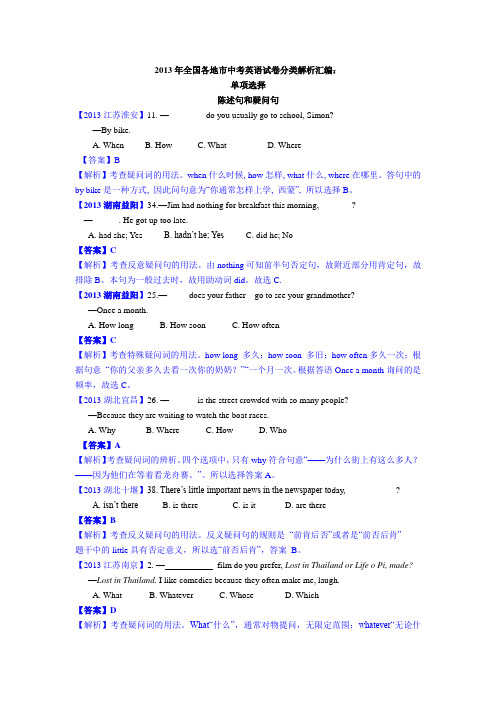
2013年全国各地市中考英语试卷分类解析汇编:单项选择陈述句和疑问句【2013江苏淮安】11. —________ do you usually go to school, Simon?—By bike.A. WhenB. HowC. WhatD. Where【答案】B【解析】考查疑问词的用法。
when什么时候, how怎样, what什么, where在哪里。
答句中的by bike是一种方式, 因此问句意为“你通常怎样上学, 西蒙”, 所以选择B。
【2013湖南益阳】34.—Jim had nothing for breakfast this morning, _______?—______. He got up too late.A. had she; YesB. hadn’t he; YesC. did he; No【答案】C【解析】考查反意疑问句的用法。
由nothing可知前半句否定句,故附近部分用肯定句,故排除B。
本句为一般过去时,故用助动词did。
故选C.【2013湖南益阳】25.—_____does your father go to see your grandmother?—Once a month.A. How longB. How soonC. How often【答案】C【解析】考查特殊疑问词的用法。
how long 多久;how soon 多旧;how often多久一次;根据句意“你的父亲多久去看一次你的奶奶?”“一个月一次。
根据答语Once a month询问的是频率,故选C。
【2013湖北宜昌】26. —______ is the street crowded with so many people?—Because they are waiting to watch the boat races.A. WhyB. WhereC. HowD. Who【答案】A【解析】考查疑问词的辨析。
2020届中考英语陈述句和疑问句专项练习题及答案
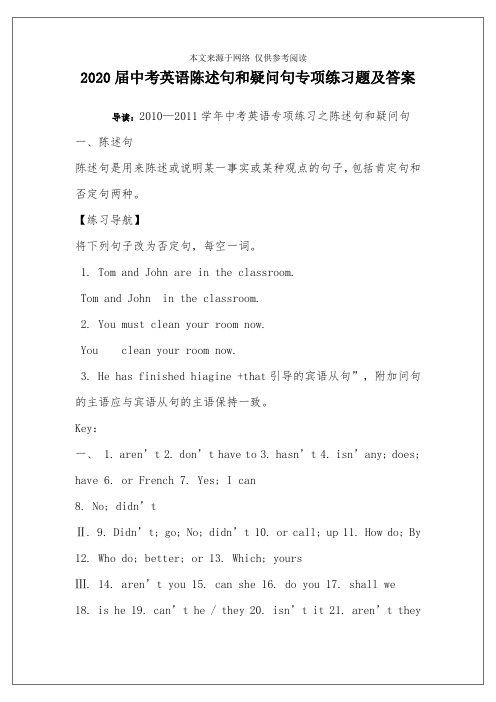
2020届中考英语陈述句和疑问句专项练习题及答案
导读:2010—2011学年中考英语专项练习之陈述句和疑问句一、陈述句
陈述句是用来陈述或说明某一事实或某种观点的句子,包括肯定句和否定句两种。
【练习导航】
将下列句子改为否定句,每空一词。
1. Tom and John are in the classroom.
Tom and John in the classroom.
2. You must clean your room now.
You clean your room now.
3. He has finished hiagine +that引导的宾语从句”,附加问句的主语应与宾语从句的主语保持一致。
Key:
一、 1. aren’t 2. don’t have to 3. hasn’t 4. isn’any; does; have 6. or French 7. Yes; I can
8. No; didn’t
Ⅱ. 9. Didn’t; go; No; didn’t 10. or call; up 11. How do; By 12. Who do; better; or 13. Which; yours
Ⅲ. 14. aren’t you 15. can she 16. do you 17. shall we 18. is he 19. can’t he / they 20. isn’t it 21. aren’t they
22. didn’t he 23. don’t they24. isn’t it 25. isn’t there
感谢您的阅读,如对您有帮助,可下载编辑。
句法练习100例(陈述句+疑问句+感叹句+祈使句+反义疑问句)
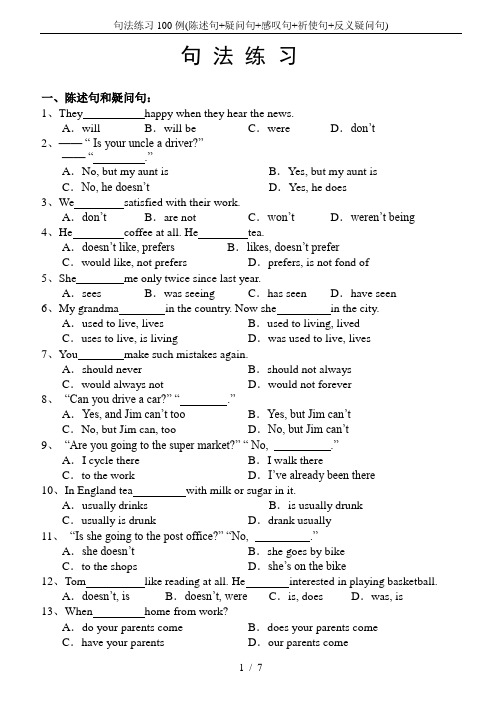
句法练习一、陈述句和疑问句:1、They happy when they hear the news.A.will B.will be C.were D.don’t 2、——“ Is your uncle a driver?”——“.”A.No, but my aunt is B.Yes, but my aunt isC.No, he doesn’t D.Yes, he does3、We satisfied with their work.A.don’t B.are not C.won’t D.weren’t being4、He coffee at all. He tea.A.doesn’t like, prefers B.likes, doesn’t preferC.would like, not prefers D.prefers, is not fond of5、She me only twice since last year.A.sees B.was seeing C.has seen D.have seen6、My grandma in the country. Now she in the city.A.used to live, lives B.used to living, livedC.uses to live, is living D.was used to live, lives7、You make such mistakes again.A.should never B.should not alwaysC.would always not D.would not forever8、“Can you drive a car?” “.”A.Yes, and Jim can’t too B.Yes, but Jim can’tC.No, but Jim can, too D.No, but Jim can’t9、“Are you going to the super market?” “ No, .”A.I cycle there B.I walk thereC.to the work D.I’ve already been there10、In England tea with milk or sugar in it.A.usually drinks B.is usually drunkC.usually is drunk D.drank usually11、“Is she going to the post office?” “No, .”A.she doesn’t B.she goes by bikeC.to the shops D.she’s on the bike12、Tom like reading at all. He interested in playing basketball.A.doesn’t, is B.doesn’t, were C.is, does D.was, is13、When home from work?A.do your parents come B.does your parents comeC.have your parents D.our parents come14、Which of the students the examination?A.not pass B.didn’t pass C.pass D.didn’t passed 15、They trouble lifting the heavy box.A.didn’t have many B.hadn’t a lot ofC.didn’t have much D.ha ven’t a great deal of 16、——“Did you have breakfast this morning?——“.”A.Yes, I had B.Yes, I did C.No, I hadn’t D.No, I didn’t have.17、colour is the cover of the dictionary?A.What B.Which C.How D.Whose18、“does he brush his teeth a day?” “Twice.”A.What time B.How long C.When D.How many times 19、There are many pictures on the wall.do you like best?A.What B.Which oneC.Which of the picture D.Which one picture20、Since when her?A.did you know B.have you knownC.do you know D.you know21、“That ten pound note belongs to me.” “.”A.Yes, it is B.Yes, it belongs C.No it doesn’t D.No, it isn’t 22、“Would you rather wait or come back later?” “.”A.I’d rather come back B.Yes, I’d rather not waitC.No, I’d rather wait D.to come back23、“shoes do you take?” “Size 42.”A.Which number B.What numberC.What size D.What24、“is the weather like today?” “ It’s windy.”A.What B.How C.What kind D.Which25、Would you read my composition and correct the mistakes, ?A.if have B.if any C.if ever D.if not26、is the distance between these two villages?A.How far B.What C.How long D.How much 27、do you go to the cinema? Twice a month.A.How many time B.How muchC.How long D.How often28、How it in English?A.you say B.do you speak C.do you say D.to speak29、is the population of the city?A.How much B.How many C.How D.What30、did she get this information?A.Whom B.Who C.Where D.What31、does your watch cost? Two hundred yuan.A.How many B.What price C.What D.How expensive32、About do you want to know more?A.Whom B.who C.which D.what33、——We haven’t heard from Jane for a long time.——What do you suppose to her.A.was happening B.to happenC.has happened D.having happened34、——Have you heard the news about Jim?——No. What ?A.is it B.it is C.are they D.they are 35、——Would you rather go there by train or by air?——.A.Yes, I would B.No, I wouldn’tC.Yes, by air D.By air36、I go or you go yourself?A.Will…will B.Shall…shall C.Shall…will D.Will…shall 37、——Do you think the question easy or not?——.A.Yes, I do B.No, I don’t C.It is easy D.Yes, it’s easy 38、Shall we stay at home or to the park?A.to go B.going C.go D.will go39、writer is better known in China, Charles Dickens or Mark Twain?A.Whichever B.Whether C.What D.Which40、——was the Nanjing-Changjiang Bridge open to traffic?——It was open to traffic in 1968.A.What B.What time C.How long D.When二、感叹句、祈使句41、from Beijing to London!A.How long way it is B.What a long way it isC.What a long way is it D.How long a way is it42、Oh, John, you gave us!A.How a pleasant surprise B.How pleasant surpriseC.What a pleasant surprise D.What pleasant surprise43、terrible weather we’ve been having these days!A.How a B.What a C.How D.What44、girl she is!A.What bright a B.How a brightC.How bright a D.What a bright45、we have today?A.How fine day B.What fine dayC.How a fine day D.What a fine day46、How flowers are!A.beautiful B.beautifully C.beautiful the D.beautiful that 47、How !A.does time fly B.times fly C.time flies D.flies time 48、What work he does!A.harder B.hard C.hardly D.hardest49、careful our monitor is!A.How a B.How C.What a D.What50、advice he gave us!A.What a B.How good C.What good D.How51、picture it is!A.What wonderful B.How a wonderfulC.What wonderful a D.How wonderful a52、I wish to pay a visit to Hong Kong!A.How do B.What do C.What D.How53、hardworking students they are!A.What B.What a C.What an D.How54、long time it lasted!A.What B.What a C.How D.How a55、down the radio. The baby’s sl eeping in the next room.A.Turning B.To turn C.Turn D.Turned56、Let’s football in the street.A.not to play B.not play C.don’t play D.not playing57、careful when you cross the street.A.Don’t be B.Do be C.Being D.Do58、the child all day long!A.Let, not to cry B.Not let, cryC.Don’t let, to cry D.Don’t let, cry59、afraid of make mistakes!A.Don’t be B.Not to be C.Not being D.Be not60、me again before coming.A.Calling B.To call C.Do calling D.Call三、反意疑问句61、You’d li ke some coffee, ?A.weren’t you B.wouldn’t you C.hadn’t you D.shouldn’t you 62、I don’t think he will come to the meeting, ?A.will he B.won’t he C.do I D.am I63、Harry and his brother promised to work harder, .A.do they B.don’t they C.did they D.didn’t they64、His father knows little about it, he?A.does B.doesn’t C.is he D.isn’t65、We all like reading story books, ?A.do we B.do you C.don’t we D.don’t you66、My sister seldom goes to the theatre she?A.doesn’t B.does C.is D.isn’t67、Your father promised to buy a computer for you, he?A.often, did B.never, didn’t C.already, did D.never, did 68、Be sure to write to us, ?A.will you B.aren’t you C.would you D.can you69、Don’t smoke in the meeting room, you?A.do you B.will you C.would D.can70、It’s fine today. Let’s go fishing, ?A.will we B.shall we C.do we D.don’t we71、Mary has few friend in Japan, she?A.has B.don’t C.doesn’t D.hasn’t72、There is a beautiful lake in this city, ?A.isn’t it B.isn’t there C.is it D.hasn’t it73、There is nothing wrong with my bike, ?A.is it B.isn’t there C.isn’t it D.is there74、He comes late sometimes, ?A.isn’t he B.comes he C.doesn’t he D.is he 75、——You are not a new comer, are you?——. I came here only yesterday.A.No, I am B.Yes, I am C.No, I’m not D.Yes, I’m not.76、She could hardly believe it, ?A.couldn’t she B.could she C.didn’t she D.did she 77、You needn’t go, ?A.can you B.must you C.need you D.may you 78、You must work hard from now on, ?A.can you B.won’t you C.mustn’t you D.needn’t you79、After walking so long a way, you must have been tired, you?A.were B.have C.haven’t D.mustn’t80、He must have left home yesterday, he?A.hasn’t B.didn’t C.mustn’t D.needn’t81、You don’t think I’m going out in such wet weather, ?A.am I B.do you C.don’t you D.do I82、You’d better call in a doctor for your mother, you?A.had B.would C.hadn’t D.wouldn’t83、You need to come earlier, you?A.don’t you B.needn’t C.don’t D.won’t84、You dare not go alone, you?A.don’t B.do C.dare D.daren’t85、He shouldn’t drink so much, he?A.should B.ought C.would D.will86、Nothing can stop us doing that, ?A.can we B.can’t we C.can’t i t D.can it87、I’m late for the meeting, ?A.are n’t I B.aren’t I C.don’t I D.aren’t you88、Nobody but I knows Japanese in my class, ?A.does he B.doesn’t he C.do they D.don’t they89、None of the workers attended the party, ?A.did they B.did he C.didn’t he D.didn’t they90、Everything is right here, ?A.isn’t it B.aren’t they C.are they D.is it91、A lovely day, ?A.is it B.does it C.isn’t it D.doesn’t it92、He isn’t a diligent boy, for it is the second time he has been late,?A.isn’t it B.is he C.has he D.is it93、My sister often needs help with her study, ?A.need she B.needn’t she C.doesn’t she D.does she94、You should have watered the flower earlier, ?A.shouldn’t you B.didn’t you C.don’t you D.haven’t yo u 95、Learning a foreign language well is not easy, ?A.is it B.isn’t it C.does it D.doesn’t it96、What a pretty girl, ?A.isn’t it B.is it C.is she D.isn’t she97、Wang Ping can’t be in the bedroom, ?A.can she B.is she C.can’t he D.i sn’t he98、I wish to visit the Palace Museum next week, ?A.do I B.Shall I C.may I D.can I99、Let us do it for you, ?A.will you B.won’t you C.shall we D.shan’t we100、They have to face the difficulty, they?A.do B.don’t C.haven’t D.w on’t【答案】:1、B2、A3、B4、A5、C6、A7、A 8、B 9、D 10、B 11、C 12、A13、A 14、B 15、C 16、B 17、A 18、D19、B 20、B 21、C 22、A 23、C 24、A25、B 26、B 27、D 28、C 29、D 30、C 31、C 32、A 33、C 34、A 35、D 36、C 37、C 38、C 39、D 40、D 41、B 42、C 43、D 44、D 45、B 46、C 47、C 48、B 49、B 50、C 51、D 52、D 53、A 54、B 55、C 56、B 57、B 58、D 59、A 60、D 61、B 62、A 63、D 64、A 65、C 66、B 67、D 68、A 69、B 70、B 71、A 72、B 73、D 74、C 75、B 76、B 77、C 78、C 79、C 80、B 81、B 82、C 83、A 84、C 85、A 86、D 87、B 88、C 89、A 90、A 91、C 92、A 93、C 94、B 95、B 96、D 97、B 98、C 99、A 100、B。
中考复习系列七:句子种类之----陈述句+疑问句+状语从句
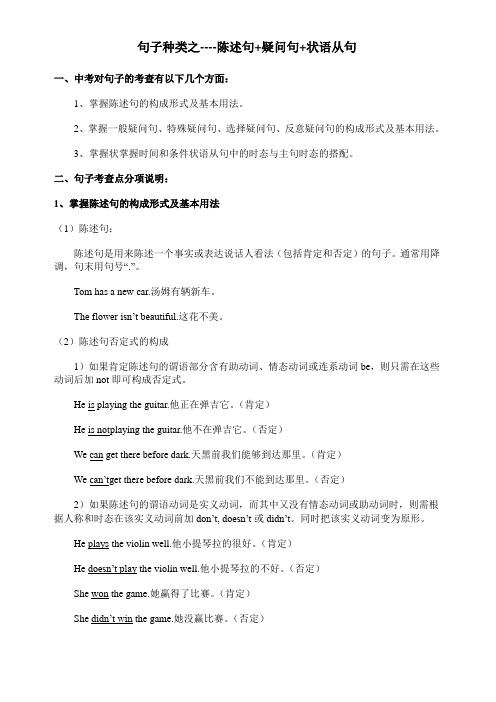
句子种类之----陈述句+疑问句+状语从句一、中考对句子的考查有以下几个方面:1、掌握陈述句的构成形式及基本用法。
2、掌握一般疑问句、特殊疑问句、选择疑问句、反意疑问句的构成形式及基本用法。
3、掌握状掌握时间和条件状语从句中的时态与主句时态的搭配。
二、句子考查点分项说明:1、掌握陈述句的构成形式及基本用法(1)陈述句:陈述句是用来陈述一个事实或表达说话人看法(包括肯定和否定)的句子。
通常用降调,句末用句号“.”。
Tom has a new car.汤姆有辆新车。
The flower isn’t beautiful.这花不美。
(2)陈述句否定式的构成1)如果肯定陈述句的谓语部分含有助动词、情态动词或连系动词be,则只需在这些动词后加not即可构成否定式。
He is playing the guitar.他正在弹吉它。
(肯定)He is notplaying the guitar.他不在弹吉它。
(否定)We can get there before dark.天黑前我们能够到达那里。
(肯定)We can’t get there before dark.天黑前我们不能到达那里。
(否定)2)如果陈述句的谓语动词是实义动词,而其中又没有情态动词或助动词时,则需根据人称和时态在该实义动词前加don’t, doesn’t或didn’t。
同时把该实义动词变为原形。
He plays the violin well.他小提琴拉的很好。
(肯定)He doesn’t play the violin well.他小提琴拉的不好。
(否定)She won the game.她赢得了比赛。
(肯定)She didn’t win the game.她没赢比赛。
(否定)2、掌握一般疑问句、特殊疑问句、选择疑问句、反意疑问句的构成形式及基本用法(1)一般疑问句:1)一般疑问句的肯定形式一般疑问句一般是指以助动词、情态动词、be动词或have(有)开始,通常要求以yes,或no来回答的疑问句,一般疑问句读时通常用升调。
英语中的陈述句和疑问句

英语中的陈述句和疑问句在英语语法中,陈述句和疑问句是两种非常基础但也非常重要的句型。
陈述句用来陈述事实或陈述观点,而疑问句则用来询问信息或确认一个观点。
本文将对这两种句型进行详细的讲解和比较。
陈述句陈述句是在英语中最常见的一种句型,也是最基本的一种。
它用于陈述事实,表达观点或描述某种情况。
一个典型的陈述句通常以主语开头,然后是动词和谓语,接着是其它补充信息。
例如:The sun rises in the east every morning.(太阳每天早上从东方升起。
)在这个例句中,“The sun”是主语,“rises”是动词,“in the east”是补充信息,而“every morning”则是补充更多的细节。
这个句子的语气是肯定的,也就是说,它表达了一种肯定的信念或者正确的观点。
另外,英语中也有一些特殊结构的陈述句,比如状语从句、倒装句和强调句等等。
这些句子的结构更为复杂,但所有的陈述句都扮演着描述和解释的角色。
疑问句与陈述句相对应,疑问句则用于提问或请求某种信息。
一个疑问句的基本结构通常由疑问词开头,然后是主语和谓语,最后是其它补充信息。
例如:What time is it now?(现在几点钟了?)在这个例句中,“What”是疑问词,“time”是主语,“is”是谓语,而“now”则是补充信息。
这个句子的语气是问询的,也就是说,它希望得到某种信息或者确认某种观点的正确性。
除了一般的疑问句,英语中还有一些特殊的疑问句,比如反义疑问句和选择疑问句。
反义疑问句用于等待肯定或否定的回答,选择疑问句则只有两种选项,用于询问主语需要选择哪种。
比较陈述句和疑问句陈述句和疑问句虽然拥有不同的功能,但它们在一些方面也有相似之处。
首先,它们都是构成一句话的基本元素,每句话都必须包含有主语和谓语。
其次,所有的陈述句和疑问句都必须符合语法的规则,否则句子会不合理或者难以理解。
最后,陈述句和疑问句都有一个标志性的声调,使其易于被别人辨认。
2015年中考英语单项选择专题练习:16陈述句和疑问句(附答案)
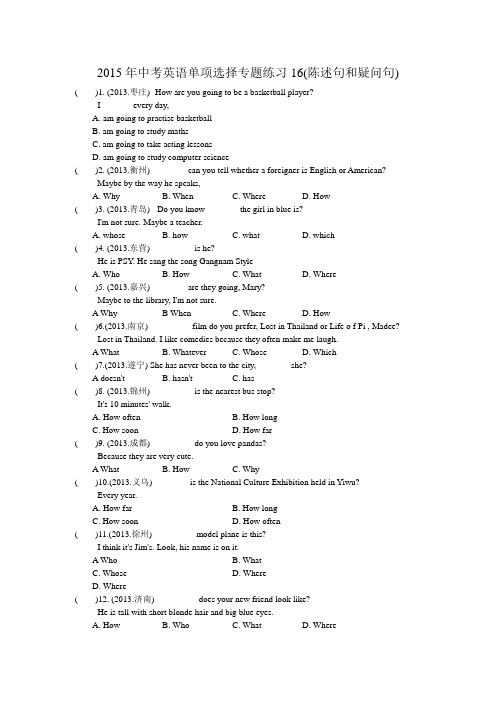
2015年中考英语单项选择专题练习16(陈述句和疑问句)( )1. (2013.枣庄)- How are you going to be a basketball player?- I_______ every day,A. am going to practise basketballB. am going to study mathsC. am going to take acting lessonsD. am going to study computer science( )2. (2013.衡州) -_______ can you tell whether a foreigner is English or American?- Maybe by the way he speaks,A. WhyB. WhenC. WhereD. How( )3. (2013.青岛) - Do you know _______ the girl in blue is?- I'm not sure. Maybe a teacher.A. whoseB. howC. whatD. which( )4. (2013.东营) -_______ is he?- He is PSY. He sang the song Gangnam StyleA. WhoB. HowC. WhatD. Where( )5. (2013.嘉兴) -_______ are they going, Mary?- Maybe to the library, I'm not sure.A WhyB When C. Where D. How( )6.(2013.南京) -_______ film do you prefer, Lost in Thailand or Life o f Pi , Madee?- Lost in Thailand. I like comedies because they often make me laugh.A What B. Whatever C. Whose D. Which( )7.(2013.遂宁) She has never been to the city, _______ she?A doesn't B. hasn't C. has( )8. (2013.锦州) -_______ is the nearest bus stop?- It's 10 minutes' walk.A. How oftenB. How longC. How soonD. How far( )9. (2013.成都) -_______ do you love pandas?- Because they are very cute.A What B. How C. Why( )10.(2013.义乌) -_______ is the National Culture Exhibition held in Yiwu?- Every year.A. How farB. How longC. How soonD. How often( )11.(2013.徐州) -_______ model plane is this?- I think it's Jim's. Look, his name is on it.A Who B. WhatC. WhoseD. WhereD. Where( )12. (2013.济南) -_______ does your new friend look like?- He is tall with short blonde hair and big blue eyes.A. HowB. WhoC. WhatD. Where( )13. (2013.泸州)Tell me the way to the cinema, _______ you?A will B. need C. shall D. may( )14.(2013.温州) - It's Father's Day, _______?- Yes. Let's buy a gift for Dad.A. isn't itB. doesn't itC. isn't heD. doesn't he( )15.(2013.菏泽) - How often do you chat with your friends online?-_______ I'm busy with my study.A. Only one month.B About twice a month.C. Almost every day.D. Maybe in two weeks.( )16. (2013.济南) - Jenny, I need some milk.- OK, Mum_______ do you need?A. How muchB. How manyC. How oftenD. How long( )17.(2013.绍兴) - Do you know_______ Jane visits her grandparents?- Once a week. She loves them deeply.A how soon B. how oftenC. how longD. how far( )18. (2013.吉林) -_______ is it from here to the museum?- About 2 kilometres.A How longB How far C. How many( ) 19. (2013.白银) - How_______ s it from Xi'an to Dunhuang?- It's less than 3_______ flightA long; hour's B. far; hour'sC. long; hours'D. far; hours'( )20. (2013.恩施) Mr Zhang hardly said a word because he was very angry yesterday, ___?A. didn't heB did heC. does he( )21. (2013.广州)Could you say it again? I can't understand_______ you are talking about.A. how B when C. what D. which( )22. (2013.宜宾) - Sam didn't go to school yesterday, did he?-_______. He was ill yesterday.A. Yes, he did B No, he didC. No, he didn'tD. Yes, he didn't( )23. (2013.牡丹江) - I've been waiting for two hours. _______ will you get here?- In ten minutes.A. How long B How soon C. How many( )24. (2013.邵阳) There is little milk in the fridge, _______?A. is thereB. isn't thereC. isn't it( )25. (2013.黄石) I don't think the newly-directed film by Zhaowei is as interesting as people say, _______?A. do youB. isn't itC. is itD. don't you( )26. (2013.济南) - Do you like summer or winter?-_______. I really like the snow.A Yes, I do B. No, I don'tC. SummerD. Winter( )27. (2013.上海) -_______ have you been in the sports club?- Since the first month I came to the school.A. How oldB. How longC. How muchD. How soon( )28. (2013.枣庄) -_______ apples do we need to make fruit salad?- Let me think . . . We need three apples.A How longB How oftenC. How muchD. How many( )29. (2013.兰州) -_______ bowl of mutton soup would you- A big bowl, please.A. What sizeB. What bigC. How muchD. How size( )30. (2013.安顺) -_______ bookcase is this?- It must be_______.A. Who's; Tom B Who's; Tom'sC. Whose; Tom'sD. Whose; Tom( )31. (2013.济南) - When did you have your school trip?A. In five daysB. For five daysC. Twice a dayD. Five days ago( )32. (2013.荆州) -_______ will Mrs Lin go to Germany?- To see her daughter there.A. HowB. WhenC. WhyD. What( )33. (2013.益阳) - Jim had nothing for breakfast -this morning, _______?-_______. He got up too late.A. had he, YesB. hadn't he; YesC. did he; No( )34. (2013. 淮安) - What brought joy to Linda just now?-_______.A Received a giftB. She received a giftC. Receiving a giftD. Because she received a gift( )35. (2013.德州) There are no words to describe_______ I miss my home town.A how much B. how many .C. how soonD. how long( )36. (2013.兰州)- He hasn't watched the movie So Young, has he?-_______. He told me it's very moving and interesting. He'd like to watch it again.A. Yes, he has B Yes, he hasn'tC. No, he hasn'tD. No, h has参考答案1—10 ADCAC DCDCD 11—20 CCAAB ABBDB21—30 CCBAC DBDAC 31—36 DCCCA A。
陈述句和疑问句

知识点总结一、陈述句陈述句是陈述一个事实或者说话人的看法的,陈述句分为肯定句和否定句。
陈述句句末用句号,朗读时用降调。
1、肯定句的基本结构为:主+谓He went to London to pass his holiday.2、否定句的表达方式(1)主语+be+not+表语He is not a teacher.(2)主语+助动词/情态动词+not+谓语动词+其他I don't think you are right. He hasn't yet paid the money. (他尚未付钱。
)(3)使用“not”以外的否定词:(a)副词:never, seldom, hardly, little, neither等。
She seldom comes to see me. (她不常来看我。
)(b)形容词:no, few, little等 He has few friends in Hong Kong. (他在香港几乎没有朋友。
)(c)代词:nothing, nobody, none等。
I found nobody about computer. (在那栋房子里我没看到任何人。
)二、疑问句疑问句的主要交际功能是提出问题,询问情况。
分为一般疑问句、选择疑问句、特殊疑问句和反意疑问句。
1、一般疑问句通常用来询问一件事情是否属实。
答句通常是"yes或no"。
句型一:Be +主语+ … Are these books on the desk 这些书在桌子上吗?句型二:Do / Does / Did + 主语 +谓语+… Do you like English 你喜欢英语吗?句型三:情态动词 + 主语 + 谓语+…Must I finish my homework now 我必须现在完成我的家庭作业吗?句型四:Have / Has + 主语 + 过去分词+…?Have you heard from him 你收到他的来信吗?另外,还有以be动词、助动词或情态动词的否定缩写形式开头的一般疑问句,这种句子一般表示请求、惊讶和对事物的看法等,回答时所用的yes和no表达的意思和汉语的习惯不同。
【教师原创】中考英语复习讲义:第十五章英语的句子种类
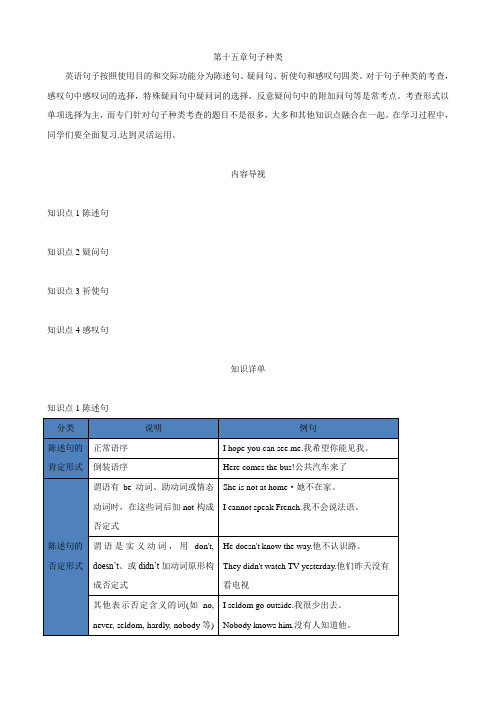
第十五章句子种类英语句子按照使用目的和交际功能分为陈述句、疑问句、祈使句和感叹句四类。
对于句子种类的考查,感叹句中感叹词的选择,特殊疑问句中疑问词的选择,反意疑问句中的附加问句等是常考点。
考查形式以单项选择为主,而专门针对句子种类考查的题目不是很多,大多和其他知识点融合在一起。
在学习过程中,同学们要全面复习.达到灵活运用。
内容导视知识点1陈述句知识点2疑问句知识点3祈使句知识点4感叹句知识详单知识点1陈述句知识点2疑问句1.2.反意疑问句的特殊用法知识点3祈使句知识点4感叹句考点突破考点1 考查疑问句的用法1.一(黔东南中考)一______ will your parents come back?-In a month.A. How longB. WhenC. How soonD. What time【解析】选C。
对“in+一段时间,提问,要用how soon“多久”。
故选Co2.(巴中中考)一did it take you to finish the work?---About three hours.A.How soonB. How longC. How often【解析】选B, about three hours是一段时间,对此提问要用how long,“多长时间”。
故选B, 3.(北京中考)一____people are there in your family?-Three.A. How oftenB. How longC. How oftenD. How much【解析】选C。
由答语可知是对可数名词数量多少的提问,用how many“多少(个)”。
故选C 4. (潍坊中考)-一______ do you go to Weifang Theatre?一Once a month.【解析】选B。
由答语可知是对频率的提问.要用How often“多久一次”。
5.(济宁中考)-_______ are you always staying up so late these days?-To prepare for my final exam.A. HowB. WhyC. WhenD. Where【解析】选B, To prepare for my final exam表示目的,对此提问要用Why。
2020年中考《陈述句和疑问句》单项选择专题练习含答案
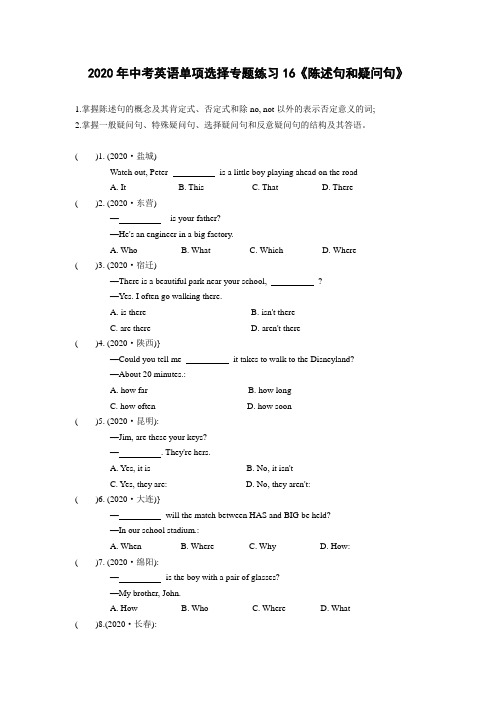
2020年中考英语单项选择专题练习16《陈述句和疑问句》1.掌握陈述句的概念及其肯定式、否定式和除no, not以外的表示否定意义的词;2.掌握一般疑问句、特殊疑问句、选择疑问句和反意疑问句的结构及其答语。
( )1. (2020·盐城)Watch out, Peter is a little boy playing ahead on the roadA. ItB. ThisC. ThatD. There( )2. (2020·东营)—is your father?—He's an engineer in a big factory.A. WhoB. WhatC. WhichD. Where( )3. (2020·宿迁)—There is a beautiful park near your school, ?—Yes. I often go walking there.A. is thereB. isn't thereC. are thereD. aren't there( )4. (2020·陕西)}—Could you tell me it takes to walk to the Disneyland?—About 20 minutes.:A. how farB. how longC. how oftenD. how soon( )5. (2020·昆明):—Jim, are these your keys?—. They're hers.A. Yes, it isB. No, it isn'tC. Yes, they are:D. No, they aren't:( )6. (2020·大连)}—will the match between HAS and BIG be held?—In our school stadium.:A. WhenB. WhereC. WhyD. How:( )7. (2020·绵阳):—is the boy with a pair of glasses?—My brother, John.A. HowB. WhoC. WhereD. What( )8.(2020·长春):—do you volunteer in Old People's Home?—Once a week. We hope to help the old more.A. How soonB. How manyC. How oftenD. How long( )9. (2020·厦门)—These shoes look cool. are they?—They are on sale, only$69.A. How muchB. How longC. How many( )10. (2020·来宾)There a basketball match in our school tomorrow.A. will haveB. will beC. areD. is going to have( )11. (2020·玉林、防城港、崇左)—Do you know a wonderful football match and two basketball matcheson July 75th?—Yeah. I am going to watch them on that day.A. there will beB. there will haveC. there areD. there have( )12.(2020·安顺)He can hardly stay awake because he is so tired, ?A. is heB. isn't heC. can't heD. can he( )13. (2020·铜仁)—Is the girl in red your friend?—. She is learning Chinese now.A. Yes, it isB. Yes, he isC. Yes, she isD. Yes, she does( )14. (2020.上海)—Disney amusement parks are there in China?—Two.A. How manyB. How oftenC. How soonD. How long( )15. (2020·宿迁)The structure of the sentence “The students visited the museum” is .A. S+ VB. S+V+DOC. S+V+IO+DOD. S+ V+DO+OC( )16.(2020·兰州)I you can finish the exam in two hours.A. does believeB. do believeC. did believedD. do believed( )17. (2020·郴州)—I feel upset because I am too heavy.—do more exercise to lose some weight?A. Why don'tB. Why notC. Why not to( )18. (2020·兰州)—will Mr. Brown be back?—In an hour.A. How longB. How oftenC. How soonD. How much( )19. (2020·襄阳)—are the students in your class?—Most of them are only fourteen.A. How longB. How oldC. How manyD. How often( )20. (2020·威海)—will you stay in England?—More than a month.A. WhenB. How soonC. How long( )21. (2020·武汉)—What's the matter, Jenny?—something wrong with my bike.A. It isB. There isC. I haveD. It has( )22. (2020·菏泽)—teachers will you miss the most after junior high school, Lisa?—Ms. Lee and Mr. Hunt.A. WhoseB. WhichC. What( )23. (2020·南充)—Is there a watermelon on the table?—.A. Yes, there isB. Yes, it isC. No, there isD. No, it isn't( )24. (2020·黄石)—Hey, Jane. are you feeling now?—Much better. Thanks.A. WhatB. WhereC. HowD. When( )25. (2020.永州)David never fights with his classmates, ?A. doe; heB. doesn't heC. isn't he( )26. (2020·天水)—You didn't find the owner of the books, did you?—. So I gave them to our teacher.A. No, I didB. Yes, 1 didn'tC. No, I didn'tD. Yes, 1 did( )27. ( 2020·龙东五市)Lets go to Disneyland in Shanghai in August, ?A. shall weB. will youC. won't you( )28.(2020·济南)—Bill, does your sister have brown hair or red hair?—. She takes after my mother.A. Yes, she doesB. No. she doesn'tC. Brown hairD. I don't know( )29.(导学号56592075)(2020·宿迁)—is it from Suqian to Jiuzhai Valley?—About 1,200 kilometers away. But I'm not sure.A. How often C. How longB. How soon D. How far( )30. (2020·济宁)—can you read in English—About 100 words a minute.A. How farB. How muchC. How fastD. How many( )31. (2020·宜宾)Nancy, sweep the classroom, ?A. don't youB. do youC. will youD. doesn't she( )32. (2020·汕尾)I don't think the newly directed movie by Zhao Wei is as interesting as peoplesay, ?A. do IB. don't IC. is itD. isn't it参考答案1~5:D、B、B、B、D 6~10:B、B、C、A、B 11~15:A、D、C、A、B 16~20:B、B、C、B、C 21~25:B、B、A、C、A 26~30:C、A、C、D、C 31~32:C、C。
中考英语专项练习之陈述句和疑问句(无答案)

陈述句与疑问句一、选择题1. ---You left the light on.---Oh, sorry. And turn it off.A.l’ve goneB.l’ll goC.l wentD.l’m going2. l’ll go to bed as soon as l my homework.A.will finishB.finishingC.finishD.to finish3.---Dick gave me a note while l in the library.---l guess he made it to say“sorry”to you.A.am readingB.was readingC.readsD.will read4.Amy to the park wiyh her mother last week.A.goB.wentC.goesD.going5.Ben and l some flowers last week.A.plantB.plantedC.plantingD.plants6.The students of our class some flowers in the garden next weekend.A.are going to growB.will grewC.are going to growingD.will grows7.lt heavily when l left the cinema.A.rainsB.will rainC.is rainingD.was raining8.l my teacher since last year. l miss him very much.A.didn’tB.sawC.haven’t seen9.—Will he come back soon?--No, he back until eight o’clock.A.won’t comeesC.did comeD.will come10. The boy homework at home.A.doesn’t do anyB.doesn’t anyC.doon’t goD.does not11.l went to the cinema yesterday. But he there.A.doesn’t goB.didn’t goC.wentD.didn’t go12.—Mr.Johnson asked me to remind you of the meeting this afternoon. Don’tforget it!--OK,l .A.won’tB.don’tC.willD.do13. We have any lessons on Sundays.A.don’tB.doesn’tC.didn’tD.aren’t14.l heard the tall girl wearing glasses is your new classmate. She’s from Amercia, ?A.has sheB. isn’t sheC.hasn’t sheD.does she15.They came here to have a meeting on time, ?A.didn’t theyB.did theyC.don’t theyD.do they16.E-mail is very popular today. People seldom write letters now, ?A.did theyB.do theyC.didn’t theyD.don’t they17.—You’re new here, ?--Yes, l’m from Dujiangyan. l came here last week.A.did theyB.do theyC.didn’t theyD.don’t they18.Don’t forget to put the book back on the shelf, ?A.do youB.don’t youC.will youD.won’t you19.—There is enough food for the birds, isn’t ?---No, We need to get some.A.itB.thereC.thatD.this20.—Million of people know about Susan Boyle now, ?-- , she becomes well-known because of her success on Britain’s Got Talent.A.do they; NoB.do they;YesC.don’t they; NoD.don’t they; Yes21. Bob, you watched the Fashion Show last night, ?A.weren’t youB.didn’t youC.haven’t youD.won’t you22.---He’s already back to Australia, ?--- , He is on a visit to Shanghai.23.Our hometown is more beautiful than before, ?A.isn’t itB.is itC.doesn’t itD.does it24.-- do you watch TV every week?--Less than two hours. l often have much homework to do.A.How manyB.How muchC.How longD.How often25.---Mr.Wang’s never been to Canada, has he?--- , He went there on business last week.A.No, he doesn’tB.Yes, he hasC.No, he hasD.Yes, he hasn’t26.--- will she stay here?---For .A.How soon; one hour and a halfB.How long; one and a half hoursC.How soon; one and half hoursD.How long; one hour and half27.-- schoolbag is this?---l guess it’s Lily’s.A.WhatB.WhoC.WhoesD.Which28. --- ?---He’s very well.A.Who’s your fatherB.How’s your fatherC. What’s your fatherD.Where’s your father29.-- will the supper be ready?l’m very hungry.--In a minute.A.How soonB.How longC.How muchD.How often30. --Your were injured in the accident, weren’t you?-- .A.Yes ,l wasB.Yes, l wasn’tC.No, l was31.--- will the foreign students be back from Xi-baipo?---In five days.A.How soonB.How oftenC.How farD.How fast32.--- won the 100th gold medal at the Olympics for China?--Zhang Yining. She’s from Beijing.A.WhoB.WhatC.WhenD.Where33.John, clean your room, ?A.will youB.shall weC.don’t youD.doesn’t he34.He hardly had anything to eat, he?A.didn’tB.hadn’tC.hadD.did35.—They haven’t paid for their tickets, have they?--- . They didn’t pay any money.A.Yes, they haveB.No, they haven’tC.Yes, they haven’tD.No, they have36.Attention, please. There a football game between China and South Korea this evening.A.is going to beB.has beenC.hasD.will have27.---Can’t he work out such an easy maths problems?--- , He is very weak in maths.A.Yes, he can’tB.No, he can’tC.No, he canD.Yes, he can28.—Have you got some water to drink?---Here you are. There still some in the tottle.A.areB.hasC.isD. have29.—lt’s a nice day, ?--Yes, a good day for a walk.A.doesn’t itB.isn’t itC.hasn’t itD.won’t it30.—She doesn’t like English , does she?-- .A.Yes, she doesB.Yes, she doesn’tC.No, she does31.There are two libraries in this city, ?A.aren’t thereB.aren’t theyC.are two32.-- do you make a banana milk shake?--Peel the banana first and blend it with milk.A.WhatB.WhenC.HowD.Where33.She was unhappy when she heard the news, ?A.was sheB.wasn’t sheC.does sheD.didn’t she二、将下列肯定句变为否定句1.l am in Class Two, Grade One.2.She is a lovely girl.3. They are friends.4.Lily’s mother is from Shanghai.5.They had a party yesterday.三、把下列句子改为一般疑问句1. l’m taking some medicine.2. She feels very tired.3. l want to fly a kite.4.The boy is eating.5.He lives in a small town.6.My father is going to drive downtown tomorrow morning.7. Lucy did yoga yesterday afternoon.8.We were going to plant trees.9. l was doing homework at that time.10.l have lived in that town for 20 years.三、按要求改写句子1. l am going to feed my bird tomorrow.(对划线部分提问)2.He’s going to the History Museum. (对划线部分提问)3.He ate two eggs and some bread for breakfast this morning. (对划线部分提问)4.l read English every day. (对划线部分提问)5.John has lunch at school every day. (对划线部分提问)6.He lived here for more than 30 years. (对划线部分提问)7. l am waiting for my son. (对划线部分提问)8. The party will begin in ten minutes. (对划线部分提问)9.My uncle visits his friends once a month. (对划线部分提问)10.l’m happy because l go to the party. (对划线部分提问)四、情景反应1.你想知道Ben 和Mike 今天谁没到学校。
疑问句语序和陈述句语序
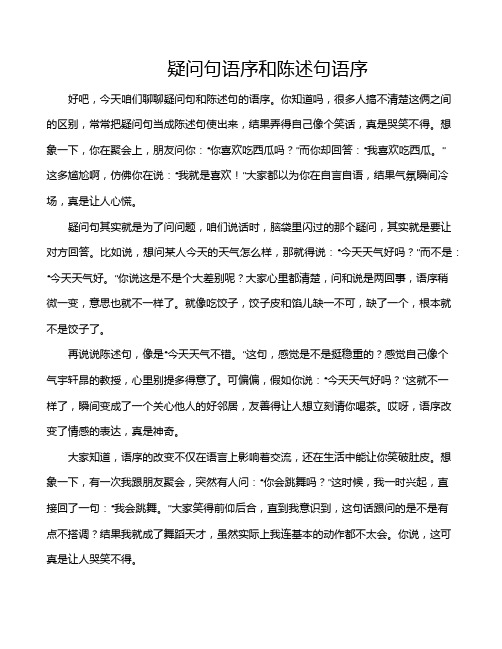
疑问句语序和陈述句语序好吧,今天咱们聊聊疑问句和陈述句的语序。
你知道吗,很多人搞不清楚这俩之间的区别,常常把疑问句当成陈述句使出来,结果弄得自己像个笑话,真是哭笑不得。
想象一下,你在聚会上,朋友问你:“你喜欢吃西瓜吗?”而你却回答:“我喜欢吃西瓜。
”这多尴尬啊,仿佛你在说:“我就是喜欢!”大家都以为你在自言自语,结果气氛瞬间冷场,真是让人心慌。
疑问句其实就是为了问问题,咱们说话时,脑袋里闪过的那个疑问,其实就是要让对方回答。
比如说,想问某人今天的天气怎么样,那就得说:“今天天气好吗?”而不是:“今天天气好。
”你说这是不是个大差别呢?大家心里都清楚,问和说是两回事,语序稍微一变,意思也就不一样了。
就像吃饺子,饺子皮和馅儿缺一不可,缺了一个,根本就不是饺子了。
再说说陈述句,像是“今天天气不错。
”这句,感觉是不是挺稳重的?感觉自己像个气宇轩昂的教授,心里别提多得意了。
可偏偏,假如你说:“今天天气好吗?”这就不一样了,瞬间变成了一个关心他人的好邻居,友善得让人想立刻请你喝茶。
哎呀,语序改变了情感的表达,真是神奇。
大家知道,语序的改变不仅在语言上影响着交流,还在生活中能让你笑破肚皮。
想象一下,有一次我跟朋友聚会,突然有人问:“你会跳舞吗?”这时候,我一时兴起,直接回了一句:“我会跳舞。
”大家笑得前仰后合,直到我意识到,这句话跟问的是不是有点不搭调?结果我就成了舞蹈天才,虽然实际上我连基本的动作都不太会。
你说,这可真是让人哭笑不得。
大家有时候为了突出疑问句,会加上一些特别的词,比如说“真的”或者“是不是”。
比如:“你真的喜欢吃榴莲吗?”这话听起来就很有劲,仿佛在试探对方的心情。
而如果你说“我喜欢吃榴莲”,那感觉就是稳稳当当的陈述,仿佛在宣告自己的品味。
说到底,语序的变化可以让你的表达方式千变万化,有时候调侃,有时候温暖,真是妙不可言。
对了,别忘了问句的语调,语调高高低低,像是在上山下海,直接影响到听者的感受。
陈述句与疑问句

陈述句与疑问句陈述句和疑问句是语言中常见的两种句子类型。
它们在表达方式、语气和语法结构等方面有一些明显的差异。
本文将深入探讨陈述句和疑问句的特点和使用方法,并以实例加以说明。
一、陈述句陈述句是用来陈述或者叙述一件事实的句子。
它主要用来表达人的观点、描述事物的特征、叙述事件的发展等。
陈述句以肯定的语气陈述事实,不带有疑问。
以下是一些陈述句的例子:1. 我非常喜欢读书。
2. 太阳正在慢慢升起。
3. 他是一名出色的演员。
4. 这个项目已经成功实施了。
5. 这幅画十分精美。
陈述句在构成上通常是主语+谓语+宾语(如果有)、状语的结构,它们通过动词和形容词等来表达句子的意思。
陈述句的语序一般是主语在前,谓语在后,但也可以根据需要调整语序。
陈述句在交流中起到了重要的作用。
它可以有效地传达信息,表达观点,陈述自己的经历和情感等。
对于陈述句的准确使用,可以提高语言表达的清晰度,使交流更加顺畅。
二、疑问句疑问句是用来提问或者询问的句子。
它以问号结尾,带有不确定或者质疑的语气。
疑问句的使用可以帮助我们获取信息、征求意见、确认事实等。
以下是一些疑问句的例子:1. 你喜欢吃中餐吗?2. 这本书是谁写的?3. 你知道今天的天气怎么样吗?4. 你几点下班?5. 你去过巴黎吗?疑问句在构成上通常是疑问词(如谁、什么、为什么)+助动词(如是、有、会)+主语+谓语+其他成分的结构。
疑问句的语序一般是主语在前,谓语在后。
特别的是,一些特殊疑问句的语序为疑问词+助动词+主语+谓语+其他成分。
疑问句在交流中常用于提问和征求意见。
它可以引导对话,收集信息,开展讨论等。
疑问句的灵活运用可以帮助我们更好地与他人互动,实现有效的沟通。
总结:陈述句和疑问句是语言中常见的句子类型。
陈述句以肯定的语气陈述事实,用来表达观点、描述事物和叙述事件;疑问句以问号结尾,带有不确定或者质疑的语气,用来提问、征求意见和确认事实。
正确运用陈述句和疑问句可以提高语言表达的准确性和清晰度,帮助我们更好地与他人交流和互动。
专题12 四大句型(陈述句、疑问句、祈使句和感叹句)_备战2021年小升初英语必考语法和题型(解析版
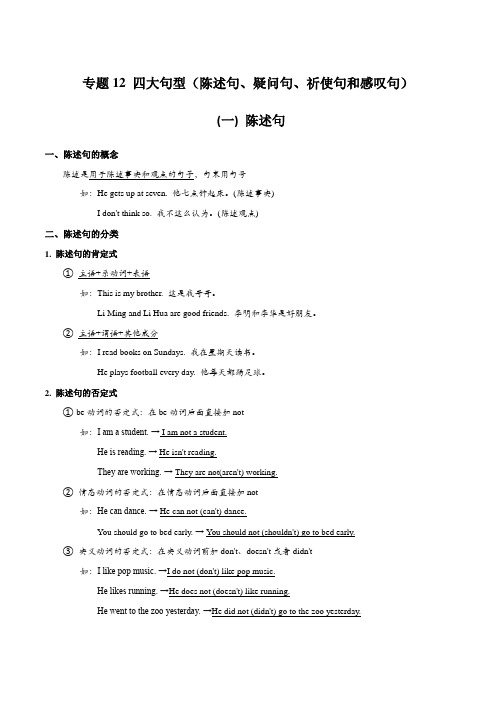
专题12 四大句型(陈述句、疑问句、祈使句和感叹句)(一) 陈述句一、陈述句的概念陈述是用于陈述事实和观点的句子,句末用句号如:He gets up at seven. 他七点钟起床。
(陈述事实)I don't think so. 我不这么认为。
(陈述观点)二、陈述句的分类1. 陈述句的肯定式①主语+系动词+表语如:This is my brother. 这是我哥哥。
Li Ming and Li Hua are good friends. 李明和李华是好朋友。
②主语+谓语+其他成分如:I read books on Sundays. 我在星期天读书。
He plays football every day. 他每天都踢足球。
2. 陈述句的否定式① be动词的否定式:在be动词后面直接加not如:I am a student. → I am not a student.He is reading. → He isn't reading.They are working. → They are not(aren't) working.②情态动词的否定式:在情态动词后面直接加not如:He can dance. → He can not (can't) dance.You should go to bed early. → You should not (shouldn't) go to bed early.③实义动词的否定式:在实义动词前加don't、doesn't或者didn't如:I like pop music. →I do not (don't) like pop music.He likes running. →He does not (doesn't) like running.He went to the zoo yesterday. →He did not (didn't) go to the zoo yesterday.基础闯关(限时10分钟满分10分)一、按要求写句子。
初中英语知识点:陈述句和疑问句
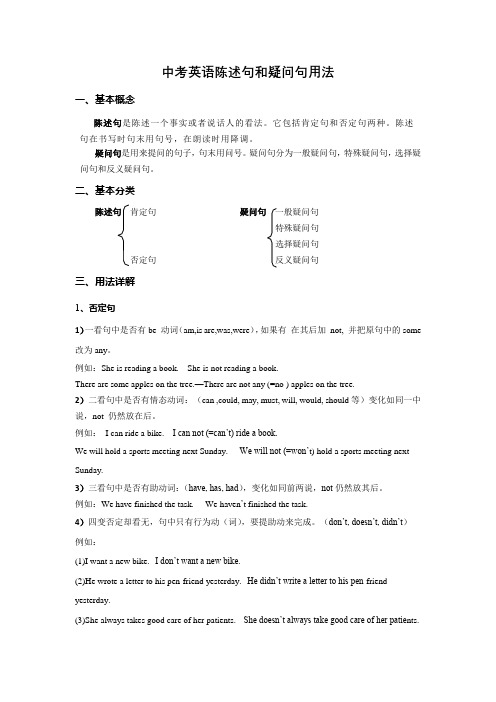
中考英语陈述句和疑问句用法一、基本概念陈述句是陈述一个事实或者说话人的看法。
它包括肯定句和否定句两种。
陈述句在书写时句末用句号,在朗读时用降调。
疑问句是用来提问的句子,句末用问号。
疑问句分为一般疑问句,特殊疑问句,选择疑问句和反义疑问句。
二、基本分类陈述句肯定句疑问句一般疑问句特殊疑问句选择疑问句否定句反义疑问句三、用法详解1、否定句1)一看句中是否有be 动词(am,is are,was,were),如果有在其后加not, 并把原句中的some 改为any。
例如:She is reading a book.---She is not reading a book.There are some apples on the tree.—There are not any (=no ) apples on the tree.2)二看句中是否有情态动词:(can ,could, may, must, will, would, should等)变化如同一中说,not 仍然放在后。
例如:I can ride a bike.---I can not (=can’t) ride a book.We will hold a sports meeting next Sunday.----We will not (=won’t) hold a sports meeting next Sunday.3)三看句中是否有助动词:(have, has, had),变化如同前两说,not仍然放其后。
例如:We have finished the task.----We haven’t finished the task.4)四变否定却看无,句中只有行为动(词),要提助动来完成。
(don’t, doesn’t, didn’t)例如:(1)I want a new bike.--I don’t want a new bike.(2)He wrote a letter to his pen-friend yesterday.--He didn’t write a letter to his pen-friend yesterday.(3)She always takes good care of her patients. --She doesn’t always take good care of her patie nts.当借助doesn’t和didn’t 构成否定后,行为动词要还原为原形。
【高中英语】高中英语学习方法:陈述句和疑问句

【高中英语】高中英语学习方法:陈述句和疑问句1.强调结构的陈述式强调结构的陈述是“Its(was)+强调部分+that(who)…”。
这种结构可以用来强调主语、宾语、状语等,但不能强调谓语动词。
在这种句型中使用that或who的区别在于:当被强调的人指代一个人时,你可以使用that或who;当重点不在人身上时,你只能使用它。
例如:itwasintheofficethathewaskilled.他是办公室被杀害的。
(强调intheoffice)是孩子打破了窗户。
孩子们打破了窗户。
(强调儿童)itwastoyouandnotanyoneelsethatilentthemoney.我只借钱给你,不借给其他人。
(强调toyouandnotanyone)只有当你有了自己的孩子,你才会意识到父母的烦恼。
当你有了自己的孩子,你就能真正理解父母的艰辛。
(只有当你有自己的孩子时才强调)2.一般疑问句的强调结构一般疑问句的强调结构是在句首提及,即使用“is/wasit+强调部分+that/who…”。
例如:isittommywhoansweredthetelephone?是汤米接的电话吗?是不是从广告中看到了一份新的文件?广告收入是报纸最赚钱的部分吗?3.特殊疑问句的强调结构特殊疑问句的重点结构是“疑问词(who/what/when/where/why/how)+is/wasitthat…”的形式。
例如:whenwasitthathegotmarried?他是什么时候结婚的?你上次见到她是什么时候?你多久以前见过她?whowasitthatwontheworldcupin1982?谁赢得了1982年的世界杯?为什么要洗浴室?为什么我总是要洗浴缸?inwhichplayofshakespeare’sisitthatviolaappears?维欧拉是在莎士比亚那个剧里出现的吗?。
- 1、下载文档前请自行甄别文档内容的完整性,平台不提供额外的编辑、内容补充、找答案等附加服务。
- 2、"仅部分预览"的文档,不可在线预览部分如存在完整性等问题,可反馈申请退款(可完整预览的文档不适用该条件!)。
- 3、如文档侵犯您的权益,请联系客服反馈,我们会尽快为您处理(人工客服工作时间:9:00-18:30)。
2018年全国各地市中考英语试卷分类解析汇编:单项选择陈述句和疑问句【2018江苏淮安】11. —________ do you usually go to school, Simon?—By bike.A. WhenB. HowC. WhatD. Where【答案】B【解析】考查疑问词的用法。
when什么时候, how怎样, what什么, where在哪里。
答句中的by bike是一种方式, 因此问句意为“你通常怎样上学, 西蒙”, 所以选择B。
【2018湖南益阳】34.—Jim had nothing for breakfast this morning, _______?—______. He got up too late.A. had she; YesB. hadn’t he; YesC. did he; No【答案】C【解析】考查反意疑问句的用法。
由nothing可知前半句否定句,故附近部分用肯定句,故排除B。
本句为一般过去时,故用助动词did。
故选C.【2018湖南益阳】25.—_____does your father go to see your grandmother?—Once a month.A. How longB. How soonC. How often【答案】C【解析】考查特殊疑问词的用法。
how long 多久;how soon 多旧;how often多久一次;根据句意“你的父亲多久去看一次你的奶奶?”“一个月一次。
根据答语Once a month询问的是频率,故选C。
【2018湖北宜昌】26. —______ is the street crowded with so many people?—Because they are waiting to watch the boat races.A. WhyB. WhereC. HowD. Who【答案】A【解析】考查疑问词的辨析。
四个选项中,只有why符合句意“——为什么街上有这么多人?——因为他们在等着看龙舟赛。
”。
所以选择答案A。
【2018湖北十堰】38. There’s little important news in the newspaper today, ___________?A. isn’t thereB. is thereC. is itD. are there【答案】B【解析】考查反义疑问句的用法。
反义疑问句的规则是“前肯后否”或者是“前否后肯”题干中的little具有否定意义,所以选“前否后肯”,答案B。
【2018江苏南京】2. —film do you prefer, Lost in Thailand or Life o Pi, made? —Lost in Thailand. I like comedies because they often make me, laugh.A. WhatB. WhateverC. WhoseD. Which【答案】D【解析】考查疑问词的用法。
What“什么”,通常对物提问,无限定范围;whatever“无论什么”;whose“谁的”;which“哪个”,通常后接限定范围。
所以选择答案D。
【2018江苏徐州】6. —________ model plane is this?—I think it's Jim's. Look,his name is on it.A. WhoB. WhatC. WhoseD. Where【答案】C【解析】考查疑问词的用法。
Who意为“谁”;What意为“什么”;Whose意为“谁的”;Where 意为“在哪里”。
由答句“it's Jim's”知,问句意为“这是谁的飞机模型”。
所以选择C。
【2018江苏淮安】15.—What brought joy to Linda just now?—________. ?A. Received a giftB. She received a giftC. Receiving a giftD. Because she received a gift【答案】C【解析】考查特殊疑问句的答语。
问句中的疑问词是what, 因此用名词或动名词作答语, 选项中只有C是动名词, 所以选择C。
【2018安徽】34. —____________ can you finish this English exam?—In about one and a half hours.A. How farB. How oftenC. How soonD. How long【答案】C【解析】考查疑问副词的用法。
how far表示多远,用于路程提问;how long 表示“(延续)多长时间”,回答用for…或since…引导的时间状语;how often 表示多久一次,指动作的频率;how soon 表示还要多久才…一般用于将来时,回答用“in…”引导的时间状语。
由答语“大约一个半小时后”,可知提问多久。
故选C。
【2018安徽】40. —Tony,__________________ are you in such a hurry?—The meeting wi ll start soon. I don’t want to be late.A. whereB. howC. whenD. why【答案】D【解析】考查疑问词辨析。
根据答语“会议快开始了,我不想迟到”,可知问句应该问“你为什么这么匆匆忙忙的?”。
故选D。
【2018福建福州】38. — _________ does your cousin go to the gym?— Twice a week.A. How longB. How oftenC. How soon【答案】B【解析】选B。
考查特殊疑问词的用法。
How long对时间段进行提问,意为“多久”;how often 对频率进行提问,意为“多久一次”;how soon对将来的时间点进行提问,意为“多久后”。
又根据该句的句意为“你的表姐多久去一次健身房?每周两次”。
故B项正确。
【2018广东湛江】26. —do you go to the library?—Once a week.A. How oftenB. How longC. How farD. How soon【答案】A【解析】选。
考查特殊疑问词。
由答语“一周一次。
”可知询问的是对方去图书馆的频率。
所以选择答案A。
【2018山东滨州】26. —do you know so much about the UFO?—I usually get the information by surfing the Internet.A. HowB. WhatC. WhichD. Where【答案】A【解析】考查特殊疑问词的辨析。
由答语“我通过通过上网获取信息。
“可知询问的是方式,所以选择答案A。
【2018山东枣庄】24.—_______apples do we need to make fruit salad?—Let me think …We need three apples.A. How longB. How oftenC. How muchD. How many【答案】D【解析】考查四个特殊疑问词组的区别。
How long :“多长”(对时间、长度等提问)How often:对频率提问“多久一次” .How much :“多少”(对钱数、不可数名词提问).How many:其后跟可数名词复数“多少”。
所以应选D。
【2018湖北孝感】26. —______ have you been married?—For twenty yearsA. How farB. how oftenC. how longD. how soon【答案】C【解析】考查疑问副词的用法辨析。
How far对距离多远提问;How often对频率提问;How long提问可对时间,空间和物体长度的提问;How soon多久,用来提问将来的时间,答语常为in +段时间。
故答案选C。
【2018湖北荆州】21. —will Mrs. Lin go to Germany?— To see her daughter there.A. HowB. WhenC. WhyD. What【答案】C【解析】考查疑问词的用法。
答句意思是“去那儿看望她的女儿”,表示“去德国”的原因,因此用疑问词why,因此选择C答案。
【2018黑龙江绥化】24. You’d better________ here ________ the heavy rain.A. not to leave; becauseB. not leave; becauseC. not leave; because of 【答案】C【解析】考查固定短语用法辨析。
句意:因为大雨,你最好不要离开。
had better do sth(最好做某事)的否定结构是had better not do sth;because是连词,其后接原因状语从句或回答以why开头的问句;而because of是复合介词,其后接名词、代词或动名词,或者what引导的名词性从句。
所以选择答案C。
【2018浙江温州】9. —It’s Father’s Day, ?—Yes. Let’s buy a gift for Dad.A. isn’t itB. doesn’t itC. isn’t heD. doesn’t he【答案】A【解析】考查反意疑问句的用法。
根据反意疑问句的句式结构“前肯后否”和上半句的主语it 可知正确答案选A。
【2018四川遂宁】26. She has never been to the city, she?A. doesn’tB. hasn’tC. has【答案】C【解析】考查反意疑问句。
句意为:她从来都没有去过这个城市,是的吗?由句中的never 可知,前面的句子为否定含义,所以后面的附加疑问部分就要用肯定形式,故选C。
【2018四川南充】23. — ________ is that man over there?—He’s my uncle.A. WhatB. WhoC. Whose【答案】B【解析】考查疑问词用法。
根据答语“他是我叔叔”,可知上句应意为“那儿的那个男人是谁?”,故答案为B。
【2018甘肃兰州】25. — ________ bowl of mutton soup would you like?— A big bowl, please.A. What sizeB. What bigC. How muchD. How size【答案】A【解析】考查疑问词辨析。
